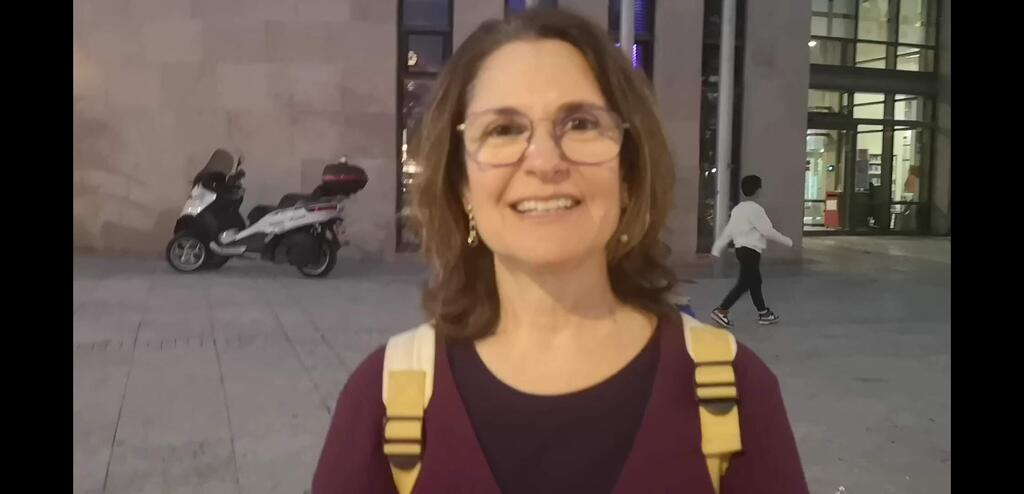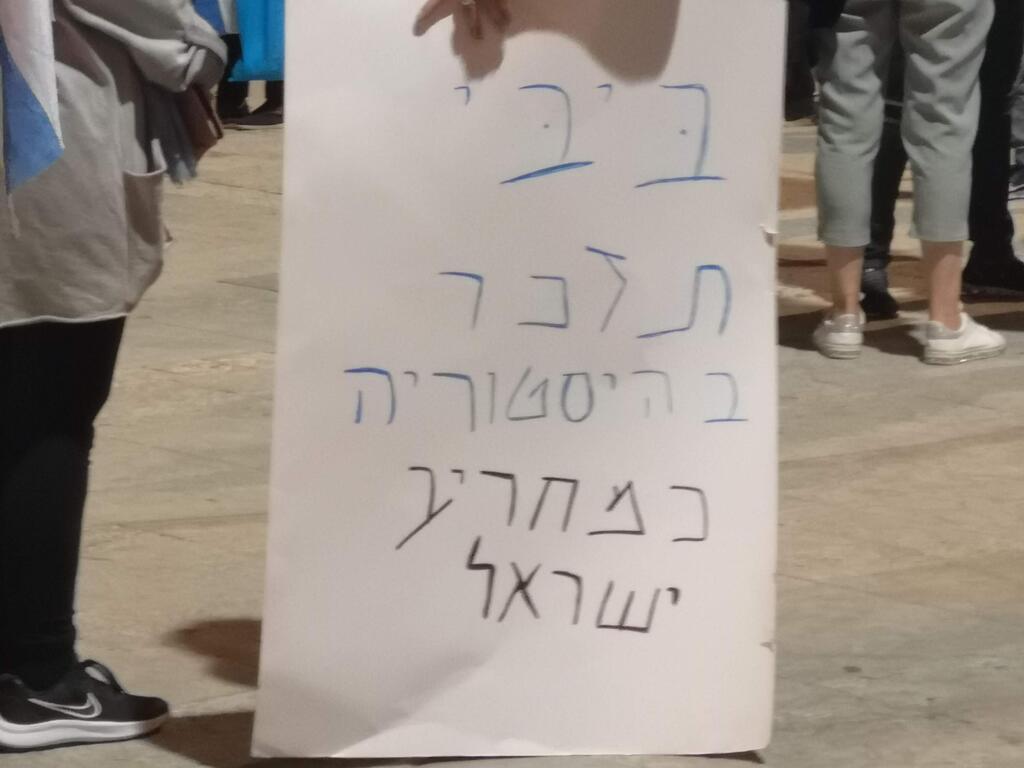
Demonstrators ahead of the protest in Jerusalem, Feb. 20.Photographer: Kobi Wolf/Bloomberg
By Sylvia Westall
March 2, 2023
Israelis block city highways as police fire stun grenades. Soldiers clash with Jewish settlers in the West Bank. An arch enemy in the Middle East seeks new arms.
Multiple crises are rocking Israel roughly two months into Prime Minister Benjamin Netanyahu’s latest term. And things only seem to be getting worse.
Tens of thousands of Israelis are protesting a government plan to overhaul the judiciary that’s deepened the divide between traditional, more religious Jews who mainly back the change and the secular professionals who see it as a threat to the Middle East’s most developed economy and democracy.
The effects are being felt in markets. This week the cost of insuring Israeli debt against default rose to the highest since 2019 for five-year credit-default swaps, and the shekel is among the worst-performing emerging market currencies.
“Israel is on the brink of internal disintegration and severe social rift,” Yuval Diskin, the former head of the domestic security agency, said at a demonstration this week, warning of the threat of civil war.
Also stirring concern is Israel’s top foe Iran — itself battling unprecedented domestic protests. Israeli officials believe Tehran wants new air-defense systems from Russia that will narrow the window for any potential strike on its nuclear sites. Iran’s stockpile of highly enriched uranium has already reached a record.
While no one is talking about an imminent attack, the rhetoric has escalated under Netanyahu. And any strike could trigger a regional conflagration affecting global oil supplies.
Closer to home, there are skirmishes between soldiers and settlers who have rampaged through Palestinian villages. There are also protests over the proposed judicial changes and escalating violence with Palestinians that threatens to increase with the coming holidays of Ramadan later this month and Passover in early April.
Sixty-two Palestinians have been killed by Israeli troops since the beginning of the year, according to the Palestinian Ministry of Health, alongside 14 Israelis.
Opposition lawmaker Efrat Rayten Marom summed up the feelings of many with her comment this week: “The country is in a dark age.”
March 2, 2023
Israelis block city highways as police fire stun grenades. Soldiers clash with Jewish settlers in the West Bank. An arch enemy in the Middle East seeks new arms.
Multiple crises are rocking Israel roughly two months into Prime Minister Benjamin Netanyahu’s latest term. And things only seem to be getting worse.
Tens of thousands of Israelis are protesting a government plan to overhaul the judiciary that’s deepened the divide between traditional, more religious Jews who mainly back the change and the secular professionals who see it as a threat to the Middle East’s most developed economy and democracy.
The effects are being felt in markets. This week the cost of insuring Israeli debt against default rose to the highest since 2019 for five-year credit-default swaps, and the shekel is among the worst-performing emerging market currencies.
“Israel is on the brink of internal disintegration and severe social rift,” Yuval Diskin, the former head of the domestic security agency, said at a demonstration this week, warning of the threat of civil war.
Also stirring concern is Israel’s top foe Iran — itself battling unprecedented domestic protests. Israeli officials believe Tehran wants new air-defense systems from Russia that will narrow the window for any potential strike on its nuclear sites. Iran’s stockpile of highly enriched uranium has already reached a record.
While no one is talking about an imminent attack, the rhetoric has escalated under Netanyahu. And any strike could trigger a regional conflagration affecting global oil supplies.
Closer to home, there are skirmishes between soldiers and settlers who have rampaged through Palestinian villages. There are also protests over the proposed judicial changes and escalating violence with Palestinians that threatens to increase with the coming holidays of Ramadan later this month and Passover in early April.
Sixty-two Palestinians have been killed by Israeli troops since the beginning of the year, according to the Palestinian Ministry of Health, alongside 14 Israelis.
Opposition lawmaker Efrat Rayten Marom summed up the feelings of many with her comment this week: “The country is in a dark age.”

Demonstrators outside Israel’s parliament, Feb. 20.
Photographer: Kobi Wolf/Bloomberg
Controversial Israeli legal reforms spark fears for economy
Agence France-Presse
March 02, 2023

Israeli Prime Minister Benjamin Netanyahu
Controversial legal reforms being debated in Israel's parliament have sparked fears in the high-tech and financial sectors that foreign investors will be scared off in a blow to growth prospects.
The new legislation has been spearheaded by the government of Prime Minister Benjamin Netanyahu, which took office in December and is regarded as the most right-wing in Israeli history.
It aims to curtail the powers of the Supreme Court and give politicians greater powers over the selection of judges.
The proposals could deal a "severe blow to the economy", former Bank of Israel governors have warned in the country that dubs itself the "start-up nation".
Writing recently in the top-selling Yediot Aharonot newspaper, former governors Karnit Flug and Jacob Frenkel acknowledged the situation "is still far from that of countries like Hungary and Poland, and its situation is immeasurably better than that of Turkey".
"But it is important to understand that there is a connection between seemingly unrelated processes, such as the ability of the judiciary to criticise the government, and confidence in the economy, which affects economic performance."
Key figures in Israel's high-tech sector -- which accounts for some 15 percent of GDP and more than half of exports -- have played a key role in the protest movement, which has seen mass rallies in Tel Aviv and other cities.
The judicial reform program includes a clause which permits parliament to annul decisions by the Supreme Court, which Netanyahu and his far-right allies view as politicized.
'Corruption and uncertainty'
Some analysts say uncertainties related to the reforms have already triggered a decline in the economy, with the value of the Israeli shekel falling seven percent against the US dollar since the end of January.
The shekel slumped further after parliament voted in favor of two clauses at first reading on February 21.
This week it was trading at 3.67 shekels to the dollar, a four-year low.
The Tel Aviv Stock Exchange (TASE) was down 5.7 percent over the past month.
High-tech workers have taken part in the protests, saying the industry will suffer if foreign firms lose confidence in the legal system and democratic principles.
Dror Salee, a leading high-tech entrepreneur for the past 25 years, says the impact is already being felt.
"There are no figures yet on the decline in foreign investment, which represents 85 percent to 90 percent of investment in high-tech -- but I don't know of a start-up that is managing to raise funds in this moment," Salee said.
"Everything we have built over the past 20 to 30 years is collapsing," added Salee, who has taken part in the protests as one of the leaders of the high-tech sector.
"There is a close link... between economic growth and investment on the one hand and the democratic system on the other", said Omar Moav, economics professor at Britain's University of Warwick and Reichman University near Tel Aviv.
"When the judiciary is weakened and the executive can set the rules of the game at its discretion, it opens the door to corruption and uncertainty, two things that will put off investors and markets."
'Snowball effect'
Salee warned of a "snowball effect", should lawmakers adopt the reforms -- currently being debated in parliament with several legislative stages still to go.
"Israelis, who often go to work abroad in high-tech for a few years, will be more likely to leave and fewer to return," he said.
"The sector will lose its comparative advantage in terms of human capital, which will feed the loss of investments."
Israel's tech sector expanded substantially during Netanyahu's previous 12-year stint in office until 2021. That year the sector accounted for 54 percent of Israeli exports, or $67 billion, according to the most recent figures from the Israel Innovation Authority.
Some critics tie the reform proposals to Netanyahu's trial on charges of bribery, fraud and breach of trust. He denies the allegations and any link between the reforms and his own court case.
But Moav notes that before the corruption cases in 2019, Netanyahu opposed the judicial reforms.
"Netanyahu, who knows full well the economic cost of judicial reform, is ready to pay the price to escape his run-ins with the law," he charged.
© 2023 AFP
Agence France-Presse
March 02, 2023

Israeli Prime Minister Benjamin Netanyahu
Controversial legal reforms being debated in Israel's parliament have sparked fears in the high-tech and financial sectors that foreign investors will be scared off in a blow to growth prospects.
The new legislation has been spearheaded by the government of Prime Minister Benjamin Netanyahu, which took office in December and is regarded as the most right-wing in Israeli history.
It aims to curtail the powers of the Supreme Court and give politicians greater powers over the selection of judges.
The proposals could deal a "severe blow to the economy", former Bank of Israel governors have warned in the country that dubs itself the "start-up nation".
Writing recently in the top-selling Yediot Aharonot newspaper, former governors Karnit Flug and Jacob Frenkel acknowledged the situation "is still far from that of countries like Hungary and Poland, and its situation is immeasurably better than that of Turkey".
"But it is important to understand that there is a connection between seemingly unrelated processes, such as the ability of the judiciary to criticise the government, and confidence in the economy, which affects economic performance."
Key figures in Israel's high-tech sector -- which accounts for some 15 percent of GDP and more than half of exports -- have played a key role in the protest movement, which has seen mass rallies in Tel Aviv and other cities.
The judicial reform program includes a clause which permits parliament to annul decisions by the Supreme Court, which Netanyahu and his far-right allies view as politicized.
'Corruption and uncertainty'
Some analysts say uncertainties related to the reforms have already triggered a decline in the economy, with the value of the Israeli shekel falling seven percent against the US dollar since the end of January.
The shekel slumped further after parliament voted in favor of two clauses at first reading on February 21.
This week it was trading at 3.67 shekels to the dollar, a four-year low.
The Tel Aviv Stock Exchange (TASE) was down 5.7 percent over the past month.
High-tech workers have taken part in the protests, saying the industry will suffer if foreign firms lose confidence in the legal system and democratic principles.
Dror Salee, a leading high-tech entrepreneur for the past 25 years, says the impact is already being felt.
"There are no figures yet on the decline in foreign investment, which represents 85 percent to 90 percent of investment in high-tech -- but I don't know of a start-up that is managing to raise funds in this moment," Salee said.
"Everything we have built over the past 20 to 30 years is collapsing," added Salee, who has taken part in the protests as one of the leaders of the high-tech sector.
"There is a close link... between economic growth and investment on the one hand and the democratic system on the other", said Omar Moav, economics professor at Britain's University of Warwick and Reichman University near Tel Aviv.
"When the judiciary is weakened and the executive can set the rules of the game at its discretion, it opens the door to corruption and uncertainty, two things that will put off investors and markets."
'Snowball effect'
Salee warned of a "snowball effect", should lawmakers adopt the reforms -- currently being debated in parliament with several legislative stages still to go.
"Israelis, who often go to work abroad in high-tech for a few years, will be more likely to leave and fewer to return," he said.
"The sector will lose its comparative advantage in terms of human capital, which will feed the loss of investments."
Israel's tech sector expanded substantially during Netanyahu's previous 12-year stint in office until 2021. That year the sector accounted for 54 percent of Israeli exports, or $67 billion, according to the most recent figures from the Israel Innovation Authority.
Some critics tie the reform proposals to Netanyahu's trial on charges of bribery, fraud and breach of trust. He denies the allegations and any link between the reforms and his own court case.
But Moav notes that before the corruption cases in 2019, Netanyahu opposed the judicial reforms.
"Netanyahu, who knows full well the economic cost of judicial reform, is ready to pay the price to escape his run-ins with the law," he charged.
© 2023 AFP
‘I've already lived under Stalin!’ Anti-government protests spread across Israel
As Wednesday marked a huge day for protests all over the country decrying the judicial reform, Holon is the latest city to join the list of local municipalities where people, waving flags and chanting aloud, are taking to the streets by the thousands
Up until now, Israelis, who wanted to make their disapproval of the government's judicial reform known, traveled to major cities like Tel Aviv, Haifa, Be'er Sheva or Jerusalem, but as the massive nationwide protests enter their third month, smaller municipalities are also having their say.
One such locale is the city of Holon, 190,000 strong, which lies just south of Tel Aviv and where thousands of flag-wielding adults, teenagers and toddlers all turned out Wednesday night, honking their horns, shouting slogans through their loudspeakers, playing their drums, singing songs, dancing or just standing in solidarity with the spirit of the demonstration.
People showed up equipped with some interesting signs. An elderly woman carried a sign that said "I've already lived under Stalin", evoking the Soviet despot in concern the reform might be a step toward absolving the government of all accountability.
A group of young women carried a sign bearing the inscription "They can take our lives, but they will never take our freedom!", an iconic quote from Mel Gibson's 1995 epic historical drama Braveheart.
Another sign addressed Prime Minister Benjamin Netanyahu directly: "Bibi, you'll go down in history as the one who ruined Israel!"
The chants, much like the signs, were varied. Some simply shouted "Democracy" over and over while others chanted "havurat mushchatim lo tivhar et hashoftim", meaning they won't allow a group of corrupt politicians to pick their judges, eluding to one of the more polarizing provisions in the reform which would give the government greater control over the judge selection process.
One of the reform opponents' gravest concerns is that Netanyahu would use it to reshape the judiciary in a way that would allow him to avoid his corruption trial.
Shelly David is a 62-year-old Holon native who shares that concern.
"I actually made a sign that urges calm between both sides but my husband didn't think it's a good idea for me to bring it," she said.

Shelly David speaks to Ynetnews about judicial reform
Regardless of how you feel about it, do you think the reform will pass?
"I don't know. The only thing I can say is that we'll keep fighting to the end, and with some help from above, we'll win in the end."
And the protest seemed to also erode boundaries between left and right. Mordechai Kirilinsky, 67, is a proud Likud voter. "I've always liked Netanyahu."

A sign saying Netanyahu will be remembered as the one who ruined the State of Israel
(Photo: Gilad Meiri)
How many times did you vote for him?
"Pretty much every time he ran, including when he beat (former prime minister Shimon) Peres after Rabin was assassinated."
So this really goes back a long time for you.
"Not just for me. My grandfather was in the Haganah (a pre-state Zionist paramilitary that served as a precursor to the IDF) and was a big fan of Menachem Begin. He wouldn't have stood for this."

Elderly woman holding sign saying she's had enough of dictatorships back in Stalin's time
(Photo: Gilad Meiri)
Weren't there signs before the elections that Netanyahu might be inclined toward supporting such a reform?
"You know what he once said? That the existence of a strong and independent judiciary is the key to all other institutions in a democracy. How could I have known he'd suddenly change his tune like that?"

A sign quoting Braveheart
(Photo: Gilad Meiri)
A politician is a politician, right?
"Sure, but there has to be a limit. This is too big of an issue to flip-flop on."
Does that mean that in the next elections, you might vote for someone like Lapid?
"I'm disappointed," he smiled. "Not insane."
As Wednesday marked a huge day for protests all over the country decrying the judicial reform, Holon is the latest city to join the list of local municipalities where people, waving flags and chanting aloud, are taking to the streets by the thousands
Up until now, Israelis, who wanted to make their disapproval of the government's judicial reform known, traveled to major cities like Tel Aviv, Haifa, Be'er Sheva or Jerusalem, but as the massive nationwide protests enter their third month, smaller municipalities are also having their say.
One such locale is the city of Holon, 190,000 strong, which lies just south of Tel Aviv and where thousands of flag-wielding adults, teenagers and toddlers all turned out Wednesday night, honking their horns, shouting slogans through their loudspeakers, playing their drums, singing songs, dancing or just standing in solidarity with the spirit of the demonstration.
People showed up equipped with some interesting signs. An elderly woman carried a sign that said "I've already lived under Stalin", evoking the Soviet despot in concern the reform might be a step toward absolving the government of all accountability.
A group of young women carried a sign bearing the inscription "They can take our lives, but they will never take our freedom!", an iconic quote from Mel Gibson's 1995 epic historical drama Braveheart.
Another sign addressed Prime Minister Benjamin Netanyahu directly: "Bibi, you'll go down in history as the one who ruined Israel!"
The chants, much like the signs, were varied. Some simply shouted "Democracy" over and over while others chanted "havurat mushchatim lo tivhar et hashoftim", meaning they won't allow a group of corrupt politicians to pick their judges, eluding to one of the more polarizing provisions in the reform which would give the government greater control over the judge selection process.
One of the reform opponents' gravest concerns is that Netanyahu would use it to reshape the judiciary in a way that would allow him to avoid his corruption trial.
Shelly David is a 62-year-old Holon native who shares that concern.
"I actually made a sign that urges calm between both sides but my husband didn't think it's a good idea for me to bring it," she said.

Shelly David speaks to Ynetnews about judicial reform
(Photo: Gilad Meiri)
"I'm also a bit worried about the idea that Netanyahu is using it to get out of his legal trouble. I don't have all the proof for this, but it is a concern."
Shelly Atzmon, a 37-year-old mother of two, was more adamant. "We can't allow this reform to happen. We just can't."
What provision from the overall reform package bothers you the most?
"The fact that 61 Knesset members that have a political agenda are going to overrule Supreme Court justices? How can this be? We're no longer a democracy if we just stand by and let this go on. This isn't Syria."
How do you respond to those who want accountability for the Judiciary?
"Don't make me laugh. Their version of accountability is that they'll use the status in the Knesset to make their interests the law of the land. That's not accountability. I don't trust any of them."

Protesters waving flags in Holon
(Photo: Gilad Meiri)
"I'm also a bit worried about the idea that Netanyahu is using it to get out of his legal trouble. I don't have all the proof for this, but it is a concern."
Shelly Atzmon, a 37-year-old mother of two, was more adamant. "We can't allow this reform to happen. We just can't."
What provision from the overall reform package bothers you the most?
"The fact that 61 Knesset members that have a political agenda are going to overrule Supreme Court justices? How can this be? We're no longer a democracy if we just stand by and let this go on. This isn't Syria."
How do you respond to those who want accountability for the Judiciary?
"Don't make me laugh. Their version of accountability is that they'll use the status in the Knesset to make their interests the law of the land. That's not accountability. I don't trust any of them."

Protesters waving flags in Holon
(Photo: Gilad Meiri)
Regardless of how you feel about it, do you think the reform will pass?
"I don't know. The only thing I can say is that we'll keep fighting to the end, and with some help from above, we'll win in the end."
And the protest seemed to also erode boundaries between left and right. Mordechai Kirilinsky, 67, is a proud Likud voter. "I've always liked Netanyahu."

A sign saying Netanyahu will be remembered as the one who ruined the State of Israel
(Photo: Gilad Meiri)
How many times did you vote for him?
"Pretty much every time he ran, including when he beat (former prime minister Shimon) Peres after Rabin was assassinated."
So this really goes back a long time for you.
"Not just for me. My grandfather was in the Haganah (a pre-state Zionist paramilitary that served as a precursor to the IDF) and was a big fan of Menachem Begin. He wouldn't have stood for this."

Elderly woman holding sign saying she's had enough of dictatorships back in Stalin's time
(Photo: Gilad Meiri)
Weren't there signs before the elections that Netanyahu might be inclined toward supporting such a reform?
"You know what he once said? That the existence of a strong and independent judiciary is the key to all other institutions in a democracy. How could I have known he'd suddenly change his tune like that?"

A sign quoting Braveheart
(Photo: Gilad Meiri)
A politician is a politician, right?
"Sure, but there has to be a limit. This is too big of an issue to flip-flop on."
Does that mean that in the next elections, you might vote for someone like Lapid?
"I'm disappointed," he smiled. "Not insane."
No comments:
Post a Comment